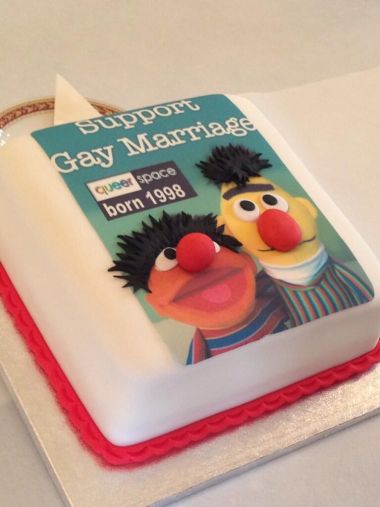Christian gay cake row: Politician calls for law change

A Private Member's Bill to introduce a conscience clause into law has been launched by a Christian politician in Northern Ireland.
Backed by First Minister Peter Robinson, Lagan Valley DUP MLA Paul Givan proposed the Freedom of Conscience Bill in response to legal action taken by the Equality Commission against Ashers Bakery. The Christian-run family business refused to make a cake in support of gay marriage earlier this year.
The case has divided opinion. The McArthur family have been accused of discrimination, but they maintain that making the cake "was at odds with our beliefs...we are certainly convinced that we have made the right decision."
In an article published yesterday, Givan, who is a member of the Free Presbyterian Church, argued that "there should be legislation that strikes a balance between competing and at times conflicting rights".
"Specifically what is required, and delivered by my Bill, is enhancing the sexual orientation goods and services legislation in order to protect religious service providers and those who want to access services in the context of a religious ethos," he said.
"My Bill would mean that 'reasonable accommodation' would be made in certain tightly defined circumstances. This would allow our society to make space for difference that encourages a tolerant society allowing people of faith equality of opportunity to contribute and participate fully in our community."
Givan believes that legal action bought by the Equality Commission indicates a "hierarchy of rights where all minorities are not to be treated equally".
"Gay rights, and the right to have those rights endorsed and promoted by everyone, is more important than the rights of Christians to live according to their conscience," he added, according to the BBC.
However, Irish republican party Sinn Fein has vowed to oppose Givan's bill. A spokesperson for the party said last night that it was "opposed to any dilution of equality legislation".
The director of the Rainbow Project, a gay rights charity in Northern Ireland, has also accused Givan of promoting "hostility" against LGBT people.
The bill is "not motivated by a desire to protect those of religious belief but by a hostility to lesbian, gay and bisexual people and their hard-won rights," he told the BBC.
"This is just updating, 'no dogs, no blacks, no Irish' to include 'no gays'," he said.
Colin Hart of the Christian Institute, which is supporting the McArthurs, warned in July that the bakery's case "is a sign of things to come exactly as we predicted".
Insisting that there must be room within the law to "reasonably accommodate family-run businesses with firmly held beliefs", Hart added: "The Government repeatedly failed to listen to members of the public, lawyers, constitutional experts even its own MPs when they called for safeguards to protect those who back traditional marriage, whether at work or in business.
"All the McArthurs want is to run their bakery according to their Christian beliefs. There won't be many situations where they need to turn down an order but this is obviously one of them. No one should be forced to use their creative skills to promote a cause which goes against their consciences. Imbalanced equality laws are making it increasingly hard for people, especially Christians."
The McArthur family decided against fulfilling an order from LGBT activist Gareth Lee who wanted a cake decorated with the words "Support Gay Marriage".
The cake was also to be emblazoned with characters Bert and Ernie from Sesame Street locked in an embrace, along with the logo for QueerSpace – a campaign group for LGBT rights.
Though the order was originally accepted by shop staff, the management later decided to withdraw from the agreement on grounds of religious beliefs and Karen McArthur, who owns the company with her husband, Colin, phoned Lee to explain and offer a refund.
Just less than two months later, watchdog Equality Commission sent the McArthurs a letter accusing them of discrimination, and the family now face a legal battle in court.











